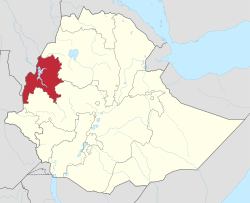
Radar | Jan 19,2024
Jul 27 , 2024
By Eden Sahle
The landslide in the Southern part of Ethiopia's Gofa Zone last week has claimed over two hundred lives, leaving communities devastated and in mourning. The traumatic task of recovering the bodies of loved ones has left a lasting scar on the survivors. With limited support, the community faces immense grief and unimaginable pain.
The human suffering and economic losses from the disaster are profound, disrupting humanitarian efforts, displacing populations, and halting economic activities without warning.
Ethiopia's vulnerability to natural disasters such as landslides, floods, and droughts is exacerbated by the lack of established emergency relief systems. These calamities not only claim lives but also worsen economic conditions and livelihoods.
It is troubling to learn that it took almost five days for leaders to address the public and declare a national day of mourning. Emergency relief and medical professionals should be dispatched to the affected region as early as possible.
The absence of excavators to expedite the search for survivors is concerning. The lack of impact-based forecasting and early warning systems leaves Ethiopians exposed to full-scale disasters. According to the World Meteorological Organisation, timely early warnings can reduce the damage caused by natural disasters by nearly a third. To address this, the organisation has initiated efforts to provide early warning systems for impending natural disasters in Africa.
Many African countries are unprepared for natural disasters. Recent floods in Kenya, which claimed close to two hundred lives and destroyed infrastructure, highlight this vulnerability. Tanzania and Somalia have also faced floods, displacing thousands. Without proper systems to manage natural hazards, communities in Africa must fend for themselves during sudden calamities. Recurrent disasters force them to recover from one tragedy only to be struck by another.
Environmental experts link many natural disasters to climate change. However, the lack of preparedness in emergency response and inadequate weather data collection are national issues. An effective early warning system could help people evacuate danger zones in time.
Experts note that many natural disasters in Africa are predictable and can be mitigated through informed planning and preparation. Strengthening public institutions to manage natural disasters better equips them to assist communities in need.
Implementing disaster laws clearly defines the roles and responsibilities of public institutions and government levels, establishing accountability. Engaging communities and nonprofit organisations create a supportive environment for managing disasters and their aftermath.
Without comprehensive disaster management legislation, disaster risk reduction is challenging. Government unpreparedness and competing priorities complicate disaster prevention and recovery efforts.
Regulatory frameworks are essential for facilitating international support when disasters exceed domestic capabilities. These guidelines ensure smooth coordination and distribution of emergency relief, including shelter solutions for affected citizens.
Training communities in high-risk areas can reduce their vulnerability and damage from disasters. South Africa's Disaster Management Act empowers communities by law to reduce disaster risks, demonstrating the value of public knowledge and input in disaster management.
South Africa has successfully integrated traditional weather observation methods from the community into its official assessments. Community insights on cloud formations and bird flight patterns serve as early warnings of flooding.
Community knowledge is invaluable. Ethiopia can learn from South Africa's example to prevent extensive damage from natural disasters. As the climate worsens, hands-on training, public engagement, and preparedness are crucial to mitigating the impact of future disasters like the recent tragedy in Gofa Zone.
PUBLISHED ON
Jul 27,2024 [ VOL
25 , NO
1265]

Radar | Jan 19,2024

Sunday with Eden | Apr 28,2024

Radar | Dec 08,2024

Fortune News | Oct 15,2022

Fortune News | Mar 18,2023

Fortune News | Oct 07,2023

Radar | Jul 17,2022

Fortune News | Jan 07,2024

Radar | Jun 30,2024

Life Matters | Jul 20,2024

My Opinion | 131507 Views | Aug 14,2021

My Opinion | 127863 Views | Aug 21,2021

My Opinion | 125841 Views | Sep 10,2021

My Opinion | 123471 Views | Aug 07,2021

Dec 22 , 2024 . By TIZITA SHEWAFERAW
Charged with transforming colossal state-owned enterprises into modern and competitiv...

Aug 18 , 2024 . By AKSAH ITALO
Although predictable Yonas Zerihun's job in the ride-hailing service is not immune to...

Jul 28 , 2024 . By TIZITA SHEWAFERAW
Unhabitual, perhaps too many, Samuel Gebreyohannes, 38, used to occasionally enjoy a couple of beers at breakfast. However, he recently swit...

Jul 13 , 2024 . By AKSAH ITALO
Investors who rely on tractors, trucks, and field vehicles for commuting, transporting commodities, and f...

Jun 28 , 2025
Meseret Damtie, the assertive auditor general, has never been shy about naming names...

Jun 21 , 2025
A well-worn adage says, “Budget is not destiny, but it is direction.” Examining t...

Jun 14 , 2025
Yet again, the Horn of Africa is bracing for trouble. A region already frayed by wars...

Jun 7 , 2025
Few promises shine brighter in Addis Abeba than the pledge of a roof for every family...

Jun 29 , 2025
Addis Abeba's first rains have coincided with a sweeping rise in private school tuition, prompting the city's education...

Jun 29 , 2025 . By BEZAWIT HULUAGER
Central Bank Governor Mamo Mihretu claimed a bold reconfiguration of monetary policy...

Jun 29 , 2025 . By BEZAWIT HULUAGER
The federal government is betting on a sweeping overhaul of the driver licensing regi...

Jun 29 , 2025 . By NAHOM AYELE
Gadaa Bank has listed 1.2 million shares on the Ethiopian Securities Exchange (ESX),...